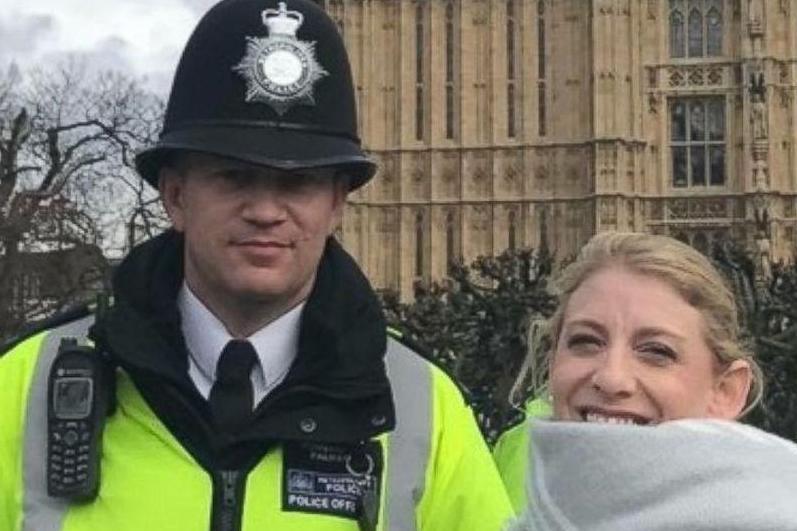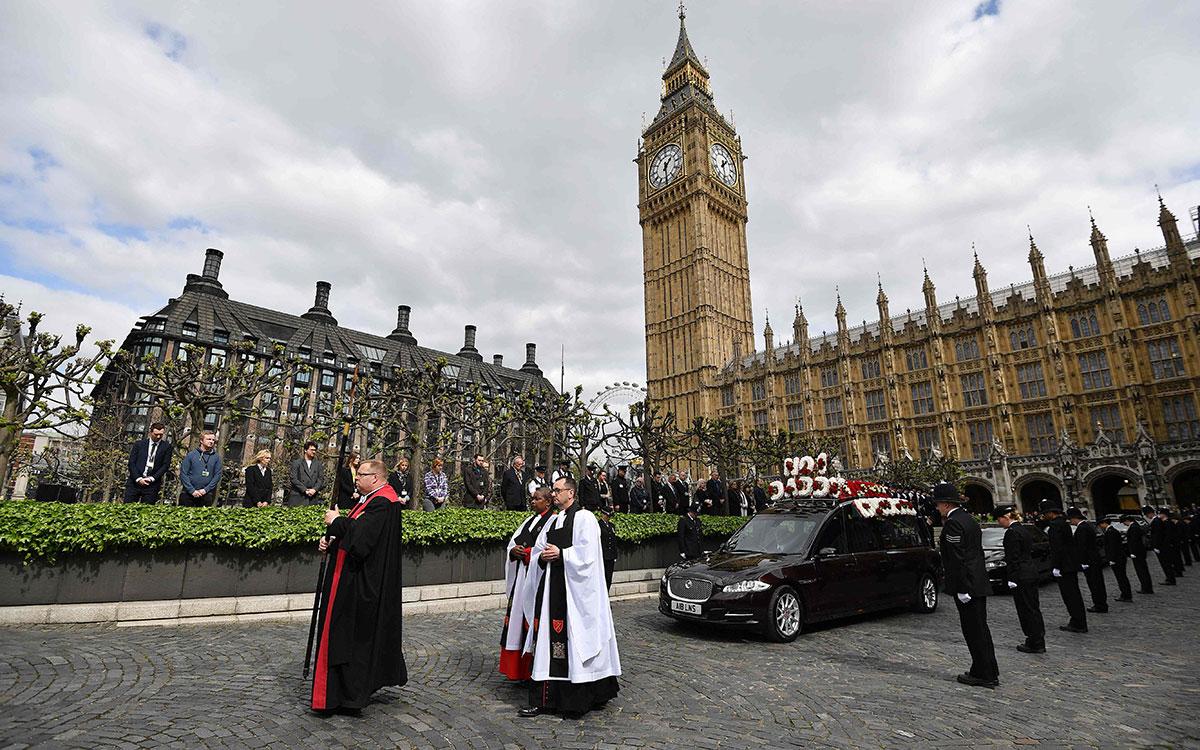Westminster inquests: Police officer describes moment terrorist looked him 'directly in the eye' before murdering PC Keith Palmer
Officer tried to 'rugby tackle' knife-wielding terrorist but could not reach him before he started stabbing PC Keith Palmer
A police officer who tried to save PC Keith Palmer during the Westminster attack has told how Khalid Masood looked him “directly in the eye” during his rampage.
PC Nick Carlisle was one of the unarmed Metropolitan Police officers posted at gates outside the Houses of Parliament on 22 March last year.
He told inquests into the victims’ deaths that he was alerted to the attack on hearing a loud bang when Masood crashed his car into railings after fatally running over four victims on Westminster Bridge.
PC Carlisle heard a report of a possible explosion over his radio and could see the grey 4x4 smoking metres away.
Giving evidence at the Old Bailey, he described a crowd of people surging away from the bridge, shouting and screaming.
“A man wearing a suit in his 40s shouted ‘men with knife stabbing people, men with knives’,” the officer said.
“As soon as he said that I was drawn to the attacker just behind.
“He looked me directly in the eye. He was coming through a crowd of people. He was not interested in members of the public. He was coming to kill police officers.”

PC Carlisle said that as one of his colleagues reacted by shouting “shut the gate”, PC Palmer urged the crowd to “come in here”.
CCTV footage previously played to the court shows Masood running through the gate at speed and starting to stab PC Palmer – the first officer he reached – immediately.
PC Carlisle said he had backed away by about 10 metres when he turned to see the terrorist attacking his colleague.
“I ran forward intending to issue a rugby tackle, shoulder barge,” he said. “He came at me with knives up. I was very close.”
The distraction gave PC Palmer time to get up and run as PC Carlisle shouted for armed support, the inquest heard, but he collapsed metres away and died at the scene of his injuries.
PC Carlisle told how he saw close protection officers with handguns drawn approaching, adding: “I indicated the suspect, making it clear who the attacker was and pointing him out.”
After Masood was shot, the officer secured him in handcuffs, fearing he was a “jihadi-type” attacker who might be wearing a suicide vest.
He then saw PC Palmer on the ground surrounded by a “gaggle of people” and went to help.
Hugo Keith, a lawyer representing the Metropolitan Police told PC Carlisle: “You bravely attempted to go towards Masood and PC Palmer to try to disable Masood, but the reality was there was no time to stop him before he got to PC Palmer and once he turned towards you with his knives there was no time or ability to stop him after that.”
Lawyer Susannah Stevens thanked the officer for his bravery in trying to help on behalf of PC Palmer’s family.
She argued that the absence of armed police stationed at Carriage Gates contributed to the officer’s death as part of an inadequate security system.
Two marksmen were on patrol in New Palace Yard but had been near the site of the attack for just 14 out of the 108 minutes before the officer was attacked, the inquests heard.
“PC Palmer, an unarmed officer, should not have been stabbed to death inside the Palace of Westminster on 22 March last year without any adequate firearms protection,“ Ms Stevens said.
“If there had been firearms officers present at that time, in our submission, on the balance of probabilities they would have been able to prevent a loss of an opportunity of saving PC Palmer’s life.
“Or to put it another way, on the balance of probabilities, their absence contributed to PC Palmer’s death.”
Dominic Adamson, representing the MC Palmer’s widow Michelle, said there had been a systematic failure in security arrangements for New Palace Yard.
“The system for protecting unarmed officers at the gates of the Palace of Westminster had failed and had been failing for years,” he said.
“The problems were, in our submission, obvious and ought to have been identified by those in authorities at the Palace of Westminster.”

He told the coroner: “In my submission it is very clear that you can be satisfied that as a result of those failures the consequences for PC Palmer were that there was a substantial loss of the opportunities for him to be saved.”
The 48-year-old died at the scene, while 52-year-old Masood was pronounced dead in hospital after being shot twice in the chest.
Kurt Cochran, 54, Leslie Rhodes, 75, Aysha Frade, 44, and Andreea Cristea, 31, died as a result of being hit by Masood’s car on Westminster Bridge.
Gareth Patterson QC, who represents their families, said the inquests had heard evidence exposing troubling areas of concern over security in Westminster and MI5’s decision not to investigate Masood as a threat.
He urged the coroner to make a report on the circumstances of the case to protect the public and said there was a black and white approach among security services, separating probes into attack planning and general evidence of extremism.
“The Frade family was quite frankly bewildered by the failure to revisit Masood, particularly in the latter years when he was again and again meeting with [Anjem Choudary’s terrorist group] al-Muhajiroun individuals,” Mr Patterson said.
He suggested security services should look again at when to investigate and when to stop, and take account of violent backgrounds such as Masood’s, who had a lengthy history of violence and domestic abuse.
Mr Patterson also suggested the coroner make recommendations to the government on regulation of hire cars after the inquests heard Masood rented a powerful Hyundai in Birmingham without any regulation.
He highlighted concerns over online radicalisation and end-to-end encryption of apps such as WhatsApp, which Masood used to send his final “Jihad” manifesto seeking to justify his actions.
Mark Lucraft QC, the Chief Coroner of England and Wales, is due to start delivering his conclusions on Wednesday and a separate inquest into Masood’s death will start later this week.
Additional reporting by PA
Bookmark popover
Removed from bookmarks